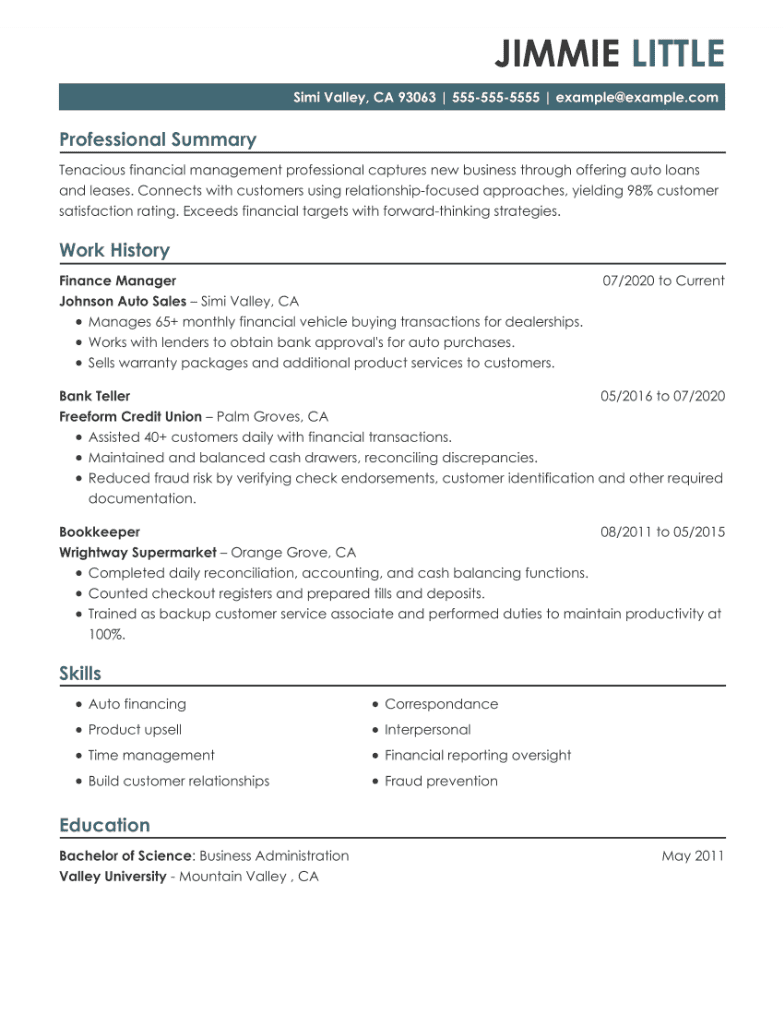We personalize your experience.
We use cookies in our website to ensure we give you the best experience, get to know our users and deliver better marketing. For this purpose, we may share the information collected with third parties. By clicking “Allow cookies” you give us your consent to use all cookies. If you prefer to manage your cookies click on the “Manage cookies” link below.
To make sure your finance resume is engaging and gets you the job you want, use these finance resume examples and tips.
Our customers have been hired by*:*Foot Note

For guidance on how to structure and organize your resume, use this finance resume example.

If you’re looking to go into the field of finance, there are many elements to consider. One of those elements is having a professional resume that fits the job description you’re looking into. No matter what job title you’re pursuing, employers will look for relevant skills and experience that stand out among job seekers. Here’s what you need to know to make sure your finance resume features these elements.
Create your resumeMany jobs fall under the umbrella of “finance.” This includes everyone from entry-level workers to people with many years of experience. If you’re looking into a finance job, you may see any of these job titles:
Your job search for these positions will be different, but similar. Every new job has distinct requirements and recommendations, and your professional experience may differ. However, because they’re all in the world of finance, you’re likely to see similar required experiences and skills.
Create your resumeHiring managers reviewing finance resumes are looking for people who are knowledgeable in the field of finance, but more importantly, they want someone who knows how to present their information clearly and concisely. Here are a few things you should be listing.
Hard skills and soft skills are both important for many finance professionals; hard skills because they inform how you manage finance using software and learned knowledge, and soft skills because they help you interact with your clients and colleagues. Here are some important skills to feature:
Don’t turn in a finance resume that only has soft skills or technical skills on it. Your potential employer wants to see that your top skills are varied, and that means your skills section needs to show your mastery in a wide range of areas.
Although your work experience is important for many finance jobs, remember that there are many different ways to have history listed in your experience section. If you have any volunteer work, internships, or academic experience, you can often list it as part of your work experience.
Achievements, awards, and educational honors are all ways that you can prove to a recruiter that you have the skills necessary for a specific job. List as many relevant achievements and awards as possible to provide a benchmark for your knowledge and skills.
Another way to showcase your competence is through the certifications you’ve earned. There are many financial certifications out there, including the following:
Certifications like these can go in your education section, but if you have many of them, create a “Certifications” section on your resume so recruiters can easily find them.
If you’re looking for resume templates and examples, you should check ResumeHelp’s resume examples. Here, you can find a variety of resume examples for a number of financial positions, like our financial advisor resume, financial analyst resume, and more. These resume samples can help you determine how to write about different experiences and which keywords recruiters are looking for.
These snippets of text at the top of your resume showcase important things to the recruiter and can be what you need to push your resume forward.
Most recruiters don’t care about your GPA, but they might care about honors like graduating Cum Laude.
With the ResumeHelp resume builder, you’ll get access to a variety of templates that ensure you’ll have a polished, professionally laid out resume.
Have questions? We’re here to help.
You should always submit a cover letter with your resume, and in the world of finance, where professionalism and formality are often highly prized, this can be even more important. You can use ResumeHelp to build a cover letter and find cover letter examples for financial positions like a financial analyst.
As long as you’re not trying to get a position that requires experience, there are many opportunities to “break into” the industry, even if you lack experience. Emphasize your skills, take courses to get certifications, and include related internships or academic experience to improve your chances of getting the job.
Every job posting should get a slightly different resume. This is because employers will look for different keywords in your resume based on the specific attributes desired for the job. If you’re looking to apply to a new job, first carefully read through the job description. Then tailor your resume to the keywords in the job description.
Couldn't find the answer you're looking for?